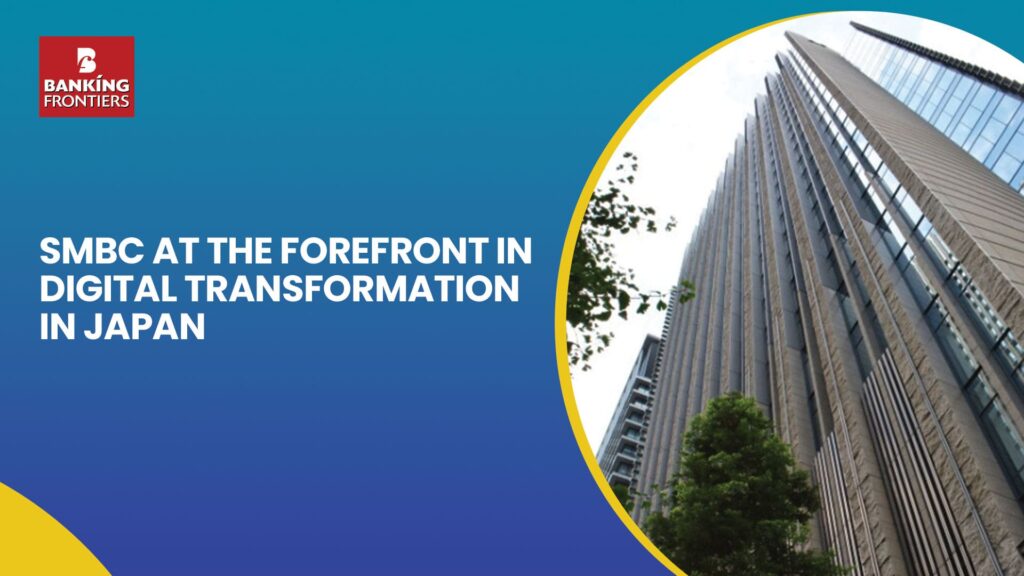The bank plans to deploy all viable technologies to make banking a friendly experience:

Japan’s Sumitomo Mitsui Banking Corporation, or SMBC, is a truly global bank with assets worth $2 trillion, and not surprisingly it is in the forefront of digital transformation. The bank has invested heavily in AI and blockchain to meet today’s challenging needs of banking business. Very recently, it has deployed a credit intelligence software developed by a UK digital bank OakNorth Bank, to derive maximum advantage in asset review process and to enhance its commercial lending proposition, especially in the US and Asia. The bank subsequently became an investor in the UK bank putting in $30 million. The system has made SMBC capable of having a superior insight into its commercial loan book and borrowers in the US and Asia.
INNOVATION CENTERS ACROSS WORLD
SMBC has its own innovation centers across the world, to support its plans for growth globally, especially in the US and Asia. It has alignments with several fintechs to bring technology to the forefront in its operations. It has recently come out with a Medium-Term Management Plan, which aims at increasing profit through ‘Transformation’, which it describes as the comprehensive optimization and remodelling of its businesses, and ‘Growth’, which is the pursuit of new opportunities.
The bank had, back in 2019, announced that it intends to develop effective cashless solutions. It had then partnered with Visa and GMO with the aim of building an omnichannel digital payment platform that is interoperable with multiple payment methods and external partners. It had also partnered with blockchain startup R3, to develop a proof of concept (PoC) utilizing Marco Polo to streamline paper-based trade document investigation and sanction check processes. These collaborations have been clear indications of the bank’s plan for digital transformation, even as Japanese banks in general are conservative in nature and any new development takes time to sink in.
MODERNIZING TRADE FINANCE
The bank has subsequently carried out a successful execution of the first trade accounts receivable discounting transaction on Marco Polo with a Japanese corporate client after the client became the first Japanese business corporation to conclude a Production License Agreement with Marco Polo. The bank is now in the process of developing a framework that offers customers consistent access to efficient trade finance execution process and coordinate with digital trade finance platforms across the world. It is also supporting customers’ digital transformation in this regard.
It has also joined Contour’s Beta Network, becoming the first Japanese bank to join the network. It has also become a member of Komgo. Contour digitizes the whole trade finance workflow. Komgo is the world’s first blockchain based platform for the commodity trade ecosystem comprising 18 of the largest global banks, trading companies and oil majors as its shareholders.
INNOVATION WITH HUMAN TOUCH
Very recently, post the pandemic hit, SMBC has announced that all its efforts are driven by ‘innovation with a human touch’, emphasizing how innovation around banking can change lives. The bank has a sustained plan to encourage research and development of promising startups in the fintech space through its global innovation centres – mainly the Digital Strategy Department in Japan, the Silicon Valley Innovation Digital Lab and the Asia Innovation Centre based in Singapore.
It is now seeking to enable inclusive access to banking, especially for the unbanked, and create more accessible financial systems for stakeholders through the products and services offered.
The bank has set up an SMBC x Tomorrow, which focuses on solutions to answer the evolving needs of its customers, investing in more efficient banking and inclusive technology.
The bank has a special program to support grassroots SMEs and working closely with the community to minimize the fallout in the local economy and benefit people based in these countries.
The bank is always in a mission mode. And it chooses to maintain a modernized infrastructure that supports the needs of the applications and services its customers require. It has recently partnered with Eden Technologies, a global professional services firm to help it on several of its modernization initiatives, including the migration of its global workforce to a modernized desktop, the upgrade of its data centers to support the latest operating systems and applications, and development of new architectures in areas of collaboration and security.
The bank has proclaimed that digitization is a pillar that penetrates its 7 core business areas. Its next phase in this transformation journey is to leverage all the viable new technologies in all business areas with the goal of increasing customer convenience, creating new businesses, increasing productivity and efficiency, and enhancing our business infrastructure.
(This article has been compiled based on publicly available information on the web, particularly the bank’s own website.)







